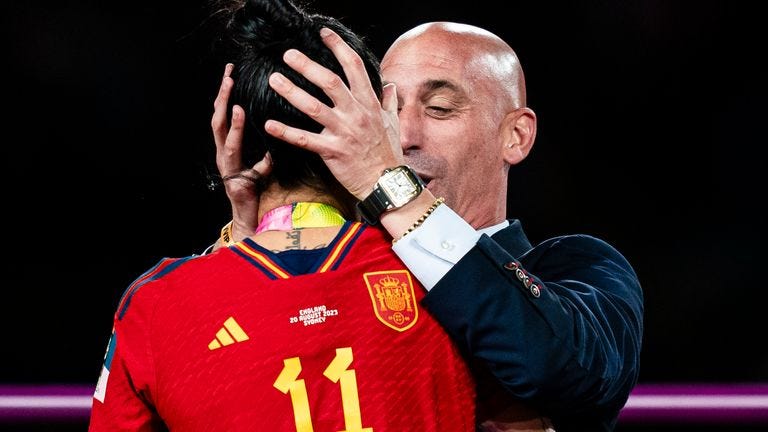Shifting the Game: Power, Consent, and Equality in Women's Sports
The FIFA suspension of Rubiales is not just about one man's transgression; it's about the systemic inequalities that plague the sports world and society at large.
In a shocking turn of events, FIFA has provisionally suspended Luis Rubiales, the president of the Spanish Football Association (RFEF), for 90 days following his inappropriate behavior after the Women's World Cup final. The incident involves a disturbing kiss between Rubiales and footballer Jenni Hermoso. Rubiales stands accused of sexually assaulting a female player on the national stage, an incident that has sparked outrage and raised important questions about gender equality, accountability, and the treatment of women in sports.
The alleged actions of Rubiales have set off shockwaves that reverberate through the collective conscience of women and advocates for gender equality. The RFEF has presented images of the encounter along with an analysis arguing that Hermoso was the one applying force to lift Rubiales off the ground. This narrative has caused a collective eye-roll among those familiar with the "she's asking for it" trope, an outdated and harmful notion that shifts blame onto victims rather than holding perpetrators accountable. The FIFA suspension of Rubiales is not just about one man's transgression; it's about the systemic inequalities that plague the sports world and society at large.
Defying Consent and Power Dynamics
Jennifer Hermoso's claims against Rubiales should make us all pause and reflect on the deeply entrenched power dynamics that enable such transgressions. The act of an authority figure violating a player's autonomy and consent casts a grim shadow over the idea of sportsmanship and respect. Hermoso's courage in speaking out sheds light on the fact that such incidents are not isolated but symptomatic of a larger issue: the unchecked privilege that men often wield over women's bodies and experiences.
At the heart of this issue lies a fundamental question: Is Luis Rubiales' career and power more valuable than a woman's right to autonomy and respect? The incident not only highlights the issue of consent but also exposes the deeper problem of male privilege and entitlement. Would Rubiales have dared to kiss a male player on the lips without consent? As many rightfully argue, "abuse is abuse," regardless of gender.
A Message Sent Loud and Clear
The controversy at hand extends beyond the immediate parties involved. It sends a chilling message to all women, athletes or not, that their autonomy and rights can be disregarded in the face of powerful men. This incident raises the unsettling question: What kind of world are we fostering if the career of one man is prioritized over a woman's right to refuse unwanted advances? The response to this incident must signal a turning point in the fight for gender equality within the sports realm and beyond. As Amber Heard said, “I spoke up against sexual violence — and faced our culture's wrath. That has to change.”
What's truly disheartening is the response from the Spanish football federation. Not only are they suing the alleged victim for speaking out, but they also seem to be disregarding the concerns of the entire women's team, who are striking in solidarity against such behavior. The statement that players have an "obligation" to play for the national team, despite endorsing misogyny, is a clear indication of a larger issue at play—one that values maintaining the status quo over progress and equality.
Cultural Norms and Gender Equality
The argument that the incident may be framed as "cultural" falls flat in the face of basic respect for consent. It's not a cultural quirk to kiss someone without their consent; it's a blatant disregard for personal boundaries. The call for solidarity among women's teams, the demand for Rubiales' removal, and the insistence on replacing leaders with a genuine commitment to women's football all underscore the urgency of dismantling norms that enable such behavior.
Gaslighting and Victim-Blaming: A Familiar Tune
The gaslighting response from the RFEF is, unfortunately, all too familiar. The presentation of images and attempts to shift the narrative detract from the heart of the matter: the alleged violation of consent. This pattern of response serves to discourage women from speaking out against abuse or misconduct, perpetuating the cycle of victim-blaming. It is crucial to reject these tactics and amplify the voices of survivors, allowing them to dictate their own stories without interference or manipulation.
Rubiales' attempt to portray himself as a victim in this scenario—labeling it a witch hunt—is a classic example of DARVO (Deny, Attack, and Reverse Victim and Offender). Such tactics only serve to silence and further marginalize victims who dare to speak out against abuse.
A Call for Change and Accountability
The solution is clear: It's time to bring in leaders who genuinely care about women's football. The incident involving Rubiales is not just about an individual's actions; it's about sending a message that misogyny and abuse will not be tolerated in sports. Women deserve a safe and respectful environment to compete and thrive, and it's the responsibility of governing bodies to ensure this.
In the end, the incident involving Luis Rubiales and Jenni Hermoso serves as a stark reminder of the challenges that still lie ahead in the fight for gender equality in sports and beyond. The world is watching, and the decisions made now will shape the future of women's sports and send a powerful message about what is and is not acceptable behavior. It's a pivotal moment that calls for accountability, change, and the empowerment of women both on and off the field.




Here we are when a man’s career and power overrides a woman’s autonomy, overrides her values and as you say amounts to a lack of respect - misogyny still alive and kicking
It's revealling how you complain that the mainstream media reporting on a famous female TV presenter being charged with domestic violence is a "witch hunt" but you have absolutely no problem with publically destroying a man over an alleged inappropriate kiss.